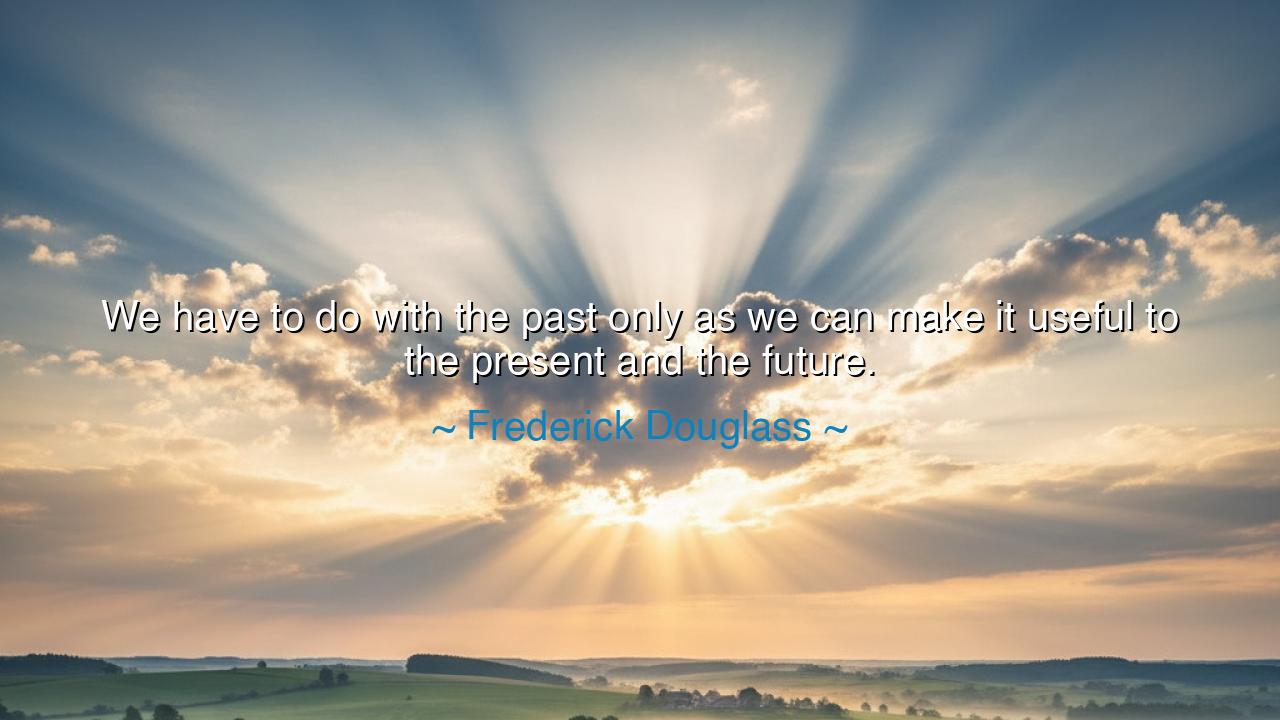
We have to do with the past only as we can make it useful to the
We have to do with the past only as we can make it useful to the present and the future.






"We have to do with the past only as we can make it useful to the present and the future." These words, spoken by the great Frederick Douglass, carry a profound lesson in how we should view our relationship with the past. Douglass, who was born into the brutal institution of slavery, understood more than most the weight of history. He knew that while the past shapes us, it does not define us, and it should not bind us to a fate of hopelessness or resentment. Instead, the past must be examined and understood in such a way that it becomes a tool for the present—something that can help us grow, build, and shape a better future.
To look to the past with the intent of making it useful is a powerful shift in perspective. It is easy to become trapped by history, to become consumed by regret, grief, or resentment over things that cannot be changed. Yet, Douglass reminds us that the true power lies in how we reframe the past. We are not bound by it; rather, we can take its lessons and its pain and transform them into a source of strength. In this way, the past becomes a foundation upon which we can build, not a prison that keeps us chained. This is the wisdom of the ancients—the idea that reflection and learning from past experiences is the way to move forward.
Consider the ancient Greeks, who revered the past not as something to mourn or regret, but as a well of wisdom from which to draw. Herodotus, the father of history, wrote not simply to record the events of his time, but to teach future generations the lessons of victory and defeat, of triumph and folly. The Greeks did not bury their past; they used it to guide their actions in the present and to make their civilization stronger. Their reflection on history was not for the purpose of reliving old wounds, but for understanding the human condition and applying that knowledge to future endeavors. This mindset allowed them to create lasting art, philosophy, and democracy.
In the case of Frederick Douglass, his personal history was a source of both pain and power. Born into slavery, he could have been consumed by the injustice of his past, but instead, he used it to fuel his fight for freedom and equality. Douglass's own experience gave him the strength to advocate for the abolition of slavery and to speak out for the rights of all people, especially African Americans. His past was a tool—shaped by his suffering, yes, but also by his resilience. Douglass transformed his personal history into a weapon of liberation. He did not allow the horrors of slavery to define him; he used them as a catalyst for his work toward a more just future.
The lesson Douglass offers is as relevant today as it was in his time. We live in a world where past injustices—whether they are racial, economic, or social—often feel overwhelming. Many are tempted to dwell on these historical wrongs, letting them create division and bitterness. However, as Douglass suggests, we must learn to look at the past with clarity, seeing not just the pain but the potential for transformation. If we can look at our own histories, both personal and collective, and ask: How can this help me today? How can I use this experience to shape a better future?—then we begin to unlock the true power of self-determination.
Consider the Civil Rights Movement in the United States. Leaders like Martin Luther King Jr. and Rosa Parks took the injustices of the past—centuries of oppression and discrimination—and instead of letting them define their lives in bitterness, they turned that history into a platform for change. King’s speech, "I Have a Dream," was not a call to dwell on the painful past but to transcend it and build a future where equality and justice prevailed. The lesson is clear: we do not heal by ignoring the past, but by using it as a guide for how we can create something better.
In practical terms, this means we must learn to reconcile with our own personal histories. Whether we have faced hardship, loss, or regret, we must take those experiences and make them useful to our present lives. This requires us to forgive, reflect, and most importantly, act. The past will always be a part of us, but it need not dictate our futures. We have the ability to shape our own destiny, just as Douglass, King, and countless others did. The work of the present is not to erase the past, but to build upon it, taking its lessons and creating something that will serve future generations.
Lastly, let us remember that the most powerful way we can use the past is by shaping it through our actions. Just as Douglass used his past to fuel his advocacy for freedom, we too can use our history—not as a weight to bear, but as the foundation of our vision for the future. Every step we take today, no matter how small, contributes to the legacy we leave for those who come after us. Let us approach the past with wisdom, clarity, and purpose, knowing that the true meaning of our history lies not in regret but in the power to transform it into a force for good.






AAdministratorAdministrator
Welcome, honored guests. Please leave a comment, we will respond soon